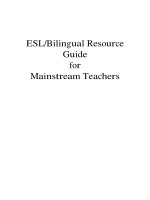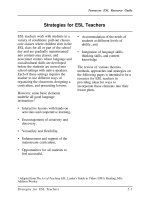Perfect phrases for classroom teachers
Bạn đang xem bản rút gọn của tài liệu. Xem và tải ngay bản đầy đủ của tài liệu tại đây (627.45 KB, 209 trang )
Perfect
Phrases
for
Classroom
Teachers
This page intentionally left blank
Perfect
Phrases
for
Classroom
Teachers
•
Hundreds of Ready-to-Use Phrases
for Parent-Teacher Conferences, Report Cards,
IEPs, and Other School Documents
•
Christine Canning Wilson
New York Chicago San Francisco Lisbon London Madrid Mexico City
Milan New Delhi San Juan Seoul Singapore Sydney Toronto
Copyright © 2010 by The McGraw-Hill Companies, Inc. All rights reserved. Except as permitted under the United States Copyright Act of 1976, no part of this publication may be
reproduced or distributed in any form or by any means, or stored in a database or retrieval
system, without the prior written permission of the publisher.
ISBN: 978-0-07-163334-5
MHID: 0-07-163334-0
The material in this eBook also appears in the print version of this title: ISBN: 978-0-07-163015-3,
MHID: 0-07-163015-5.
All trademarks are trademarks of their respective owners. Rather than put a trademark
symbol after every occurrence of a trademarked name, we use names in an editorial fashion
only, and to the benefit of the trademark owner, with no intention of infringement of the
trademark. Where such designations appear in this book, they have been printed with initial
caps.
McGraw-Hill eBooks are available at special quantity discounts to use as premiums and
sales promotions, or for use in corporate training programs. To contact a representative
please e-mail us at
TERMS OF USE
This is a copyrighted work and The McGraw-Hill Companies, Inc. (“McGraw-Hill”) and its
licensors reserve all rights in and to the work. Use of this work is subject to these terms.
Except as permitted under the Copyright Act of 1976 and the right to store and retrieve one
copy of the work, you may not decompile, disassemble, reverse engineer, reproduce,
modify, create derivative works based upon, transmit, distribute, disseminate, sell, publish
or sublicense the work or any part of it without McGraw-Hill’s prior consent. You may use
the work for your own noncommercial and personal use; any other use of the work is
strictly prohibited. Your right to use the work may be terminated if you fail to comply with
these terms.
THE WORK IS PROVIDED “AS IS.” McGRAW-HILL AND ITS LICENSORS MAKE
NO GUARANTEES OR WARRANTIES AS TO THE ACCURACY, ADEQUACY OR
COMPLETENESS OF OR RESULTS TO BE OBTAINED FROM USING THE WORK,
INCLUDING ANY INFORMATION THAT CAN BE ACCESSED THROUGH THE
WORK VIA HYPERLINK OR OTHERWISE, AND EXPRESSLY DISCLAIM ANY
WARRANTY, EXPRESS OR IMPLIED, INCLUDING BUT NOT LIMITED TO
IMPLIED WARRANTIES OF MERCHANTABILITY OR FITNESS FOR A PARTICULAR PURPOSE. McGraw-Hill and its licensors do not warrant or guarantee that the
functions contained in the work will meet your requirements or that its operation will be
uninterrupted or error free. Neither McGraw-Hill nor its licensors shall be liable to you or
anyone else for any inaccuracy, error or omission, regardless of cause, in the work or for any
damages resulting therefrom. McGraw-Hill has no responsibility for the content of any
information accessed through the work. Under no circumstances shall McGraw-Hill and/or
its licensors be liable for any indirect, incidental, special, punitive, consequential or similar
damages that result from the use of or inability to use the work, even if any of them has been
advised of the possibility of such damages. This limitation of liability shall apply to any
claim or cause whatsoever whether such claim or cause arises in contract, tort or otherwise.
Contents
Preface
ix
Acknowledgments
Introduction
1
xi
Different Interpretations
Troublesome Words
Stating Opinions
Using Demonstratives
Phrases to Absolutely Avoid
Word Choices
Using Adjectives and Verbs
Chapter 1
Perfect Phrases for Communicating
with the Parents of Your Students
Considerations When Greeting Parents
Perfect Phrases for Parental Introductions
Perfect Phrases to Politely Excuse Yourself from a Conversation
Perfect Phrases for Closing a Conversation with a Parent
Perfect Phrases for Greeting Parents Who Corner You
Perfect Phrases to End Uncomfortable Conversations
Perfect Phrases to Diffuse Gossip and Unwanted Comments
Perfect Phrases for When You Are Unexpectedly Called
to a Meeting
Perfect Phrases for Unannounced Parental Visits
Perfect Phrases for Correspondence
1
2
4
4
6
8
8
11
12
13
14
16
17
18
19
21
22
23
v
Contents
Chapter 2
Perfect Phrases for Parent-Teacher Conferences
Perfect Phrases for Welcoming Parents into the Classroom
Perfect Phrases for Opening a Parent Conference
Perfect Phrases for Reinforcing Positive Behavior
Perfect Phrases for Opening Conversations Regarding Concerns
Perfect Phrases for Helping Students Experiencing Difficulties
Perfect Phrases for Describing Behaviors That Might Require
Intervention
Perfect Phrases for Describing Inappropriate Behaviors
Perfect Phrases for Addressing Seriously Inappropriate Behaviors
Chapter 3
Perfect Phrases for Dealing with
Problematic Parents
Perfect Phrases to Describe Parents to Administrators
Perfect Phrases for Dealing with the “Helicopter” Parent
Perfect Phrases for Dealing with the “Here They
Come Again” Parent
Perfect Phrases for Dealing with Overbearing Parents
Perfect Phrases for Confronting Improper Parents
Perfect Phrases for Dealing with Angry Parents
Perfect Phrases for Dealing with Irrational Parents
Perfect Phrases for Dealing with Obnoxious or
Violent Parents
Perfect Phrases for Dealing with Parents in Denial
Perfect Phrases for Dealing with Parents with Unreasonable
Expectations
Perfect Phrases for Dealing with Indifferent Parents
Perfect Phrases for Dealing with Abuse
Chapter 4
Perfect Phrases for Homework and Coaching
Perfect Phrases for Praising Homework
Perfect Phrases for Coaching Students
Perfect Phrases for Coaching to Promote Success
vi
27
28
29
30
31
32
33
34
35
39
40
41
43
45
48
50
51
52
54
56
58
62
66
66
69
71
Contents
Perfect Phrases to Motivate Students
Perfect Phrases for Student Reminders
Perfect Phrases for Classroom Reminders
Perfect Phrases for Classroom Motivation
Perfect Phrases to Further Encourage Students
Perfect Phrases to Build Students’ Self-Esteem
Chapter 5
Perfect Phrases for Report Cards and Other
School Documents
Perfect Phrases for Describing Types of Students
Perfect Phrases for Describing Student Work Habits
Perfect Phrases for Describing Emotional Behaviors
Perfect Phrases for Evaluations
Perfect Phrases and Descriptors for a Rubric
Perfect Phrases for Discussing Report Cards with Parents
and Students
Perfect Phrases for Documentation
Perfect Phrases Used for Testing and Measurement
Perfect Phrases for Reporting Purposes
Chapter 6
Perfect Phrases for Subject-Specific
Report Cards or Homework
Perfect Phrases for Content Subject Areas
Perfect Phrases for an English and Language Arts Curriculum
Perfect Phrases for a Science Curriculum
Perfect Phrases for a Math Curriculum
Perfect Phrases for Computer-Aided Learning and Technology
Perfect Phrases for a General Health and Physical
Education Curriculum
Perfect Phrases for a Social Studies or History Curriculum
Perfect Phrases for a Foreign Language Curriculum
Perfect Phrases for a General Fine Arts Curriculum
Perfect Phrases for a Music Curriculum
72
74
75
76
78
83
85
86
87
90
92
93
98
100
103
105
108
108
109
111
114
118
121
125
128
130
131
vii
Contents
Chapter 7
Perfect Phrases for Dealing with
Student Discipline
Perfect Phrases for Classroom Management
Perfect Phrases for Common but Unacceptable Behavior
Perfect Phrases for School-Based Offenses
Perfect Phrases for Disciplinary Measures
Perfect Phrases for Describing Neutral Behaviors
Perfect Phrases to Promote Positive Actions
Perfect Phrases for Describing Improvement
Perfect Phrases for Describing Lack of Improvement
Perfect Phrases for Describing a Safety Situation
Perfect Phrases for Documenting Situations Involving
Other Teachers
Chapter 8
Perfect Phrases for Dealing with Special
Education Students
Perfect Phrases for Describing Learning Disabilities
Perfect Phrases to Help Advocate for a Child to Receive
Special Education Services
Perfect Phrases for Explaining the Special Education
Assessment Process to Parents
Perfect Phrases for Placing a Child in Special Education
Perfect Phrases for Explaining Special Education Options
Perfect Phrases for Discussing Special Education Students
with Parents
Appendix A: Academic Abbreviations
Appendix B: Important Contact Information for the
Federal Sector
Appendix C: Contacts for Departments of Education
for Individual States and U.S. Territories
viii
134
135
136
137
146
147
148
150
151
154
157
159
160
161
163
165
166
169
173
177
179
Preface
First, thank you for investing in yourself as a teacher, administrator, or
educator of children by purchasing this book. This book was designed
to aid the classroom teacher and to meet the needs of school districts.
As a previous language specialist and public speaker contracted with
the U.S. Department of State, and as an award-winning educational
consultant who has worked in elementary, secondary, and higher
education with districts, ministries of education, and industries
worldwide, I am aware of the discrepancies in our field. This book was
written to help you create a baseline to become the best teaching
professional you can be.
In my years of experience, I have learned that the key to gaining
people’s empathy, sympathy, and attention is effectively drawing
them into your world. Each word you use must be exact to avoid
turning a minor situation into a major lawsuit. Like a puppet master,
you must serve as the controller of information. That information is
released in oral or written form. The process may seem like common
sense, but it is, in fact, a valued art form.
This book will teach you guidelines for phrasing information in a
manner that will give you the best results. As an expert in the area of
English as a second language, I have studied how intonation, syntax,
paralinguistic cues, and many other factors affect second-language
acquisition. Many of the universal concepts used in linguistics also
ix
Preface
apply to the world of business, industry, and, especially, education,
because they dictate how we communicate information. The phrases
suggested in this book are adaptable to many educational situations.
By buying this reference book, you have invested in your career.
Warm regards and all the best to you in your teaching career.
x
Acknowledgments
I would like to first thank my McGraw-Hill editor, Kathryn Keil, whose
guidance was much appreciated; also, a special thanks to project editor Craig Bolt. I would like to further thank my children, Katherine and
Alexander Wilson, and my late husband, Douglas, who are my world.
In addition, I would like to thank Kathleen Canning-Bubniak and John
Canning; Maria Ouelette-Canning; Greg Bubniak; and Eina, Jillian, and
David Wilson. Thanks also go to my in-laws Sarah and Alex. But a special thanks, if not a heartfelt dedication, goes to my very supportive
parents (who are both former teachers and administrators), John and
Kathleen Canning, of Pittsfield, Massachusetts, who have helped me
every step of the way!
I would like to dedicate this book to the people who inspire me
with their friendship and guidance: Dr. Leah Bornstein-Findley; Dr.
Lisa Barlow; Dr. Linda Day; Dr. Christine Coombe; Geoff Stout; Dr. Salah
Troudi; Judy and Michelle Williamson; Laura Vance; Casey Malarcher;
Sue Powell; George Peknik; Cecilia Kawar; Lily Ford; Macarena Aguilar;
Elliott Dreger; Marlys Berg; Anthony Antil; Dawn and Amber KotskiHertzberg; Lou Reilly; Johnny, John, and Rosey McLaughlin; Justin Miaa;
Judy Fairweather and Paul Perry; Nancy Woitkowski; Greg Selah; Katie
Shawn Kerwood; Kim Senger; Margaret Coyne; Kathleen, Ed, Steve,
Karen, Michael, John, and Kevin Kotski; Denise, David, and Eleanor
Withers; Thomas and Linzie Simpson; Kellie and Jeff Montleone; Louise
Brogran; Michael, Marylou, and Bob Galliher; Joyce Culverwell, SSJ; Lil
Quinn; Barbara Faille and Kathryn Flanagan, SSJ; Fr. Peter Gregory; Fr.
xi
Acknowledgments
Michael Shavonvich; Margaret Downing; Dr. Joe Berger; Ibrahim Ali;
Yousef Al Jabri; Shamim, Maha, and Imad Mazhal; Steve Allison; Janet
Rachidi; Michael Birchell; Sam Fatima; Richard Monterosso; Lori Brandin;
Elaine and Art Plumb; Phil Quirke; Tracey Springer; Howard and Marcia
Trombley; Michelle Murphy; Suzanne Harrison; David Robin; Christine
and Jill LaBeau; Ed Carlstedt; Rick D’Ascanio; Jeff Wallace; Tom Cook;
Darren Broder; Sarah Sullivan; Angela Nicum; Sissy, Norman, Emily, and
Kelly Breault; and to the students who inspired me to write this book:
Ben Brickle, Misty Corio, Jon Lunt, Tanya Weeks, Chris White, Cassidy
Tatro, Lynda Tenario, Cristina Supple, Amanda Defer, Josh Dellert, Frank
Rodriguez, Tim Bartley, and Andy Bonin; and to all the students who
studied under me during my tenure at Taconic High School, because
you meant the world to me. I would like to further dedicate the book
to the wonderful teachers at Lanesborough Elementary School and the
education departments at MCLA and the University of Massachusetts
at Amherst.
Thanks to my colleagues over the years in the British Council; the
ministries of education in Tunisia, Algeria, UAE, Bahrain, Kuwait, Qatar,
Russia, Ukraine, and Kyrgyzstan; Joe Paris of INS and his staff at the U.S.
Embassy in Dushnanbe, Tajikistan; and, of course, the RELO officers,
public affairs officers, and staff from the U.S. Department of State: Julia
Walters, Agnes Ashton, Lisa Harshbarger, David Fay, John Scacco, Sami
Saieed, Fatema Hashem, May Kakthuda, Margaret Combs and her staff
at the American University in Kuwait, Guljan Tobleava, Alonya Sukininova, and Kathy Van De Vate. I also would like to thank state senator
Ben Downing’s office, representative Chris Speranzo’s office, congressman Thomas Cole and the National Republican Small Business Advisory
Board, the Massachusetts AMP coordinators, and SOMWBA. My deepest gratitude goes to all the teachers’ unions, MATSOL, TESOL, TESOL
Arabia, and Massachusetts Teachers Association, with a special dedication to Miles Stern, MCCC coordinators Joe Rizzo and Ellen Shanahan,
Dawn Quinlin, and, of course, the best education lawyers I have proudly
known to date: Michael Hinkley, Phillip Grandchamp, and Stephen Pagnotta, from Donovan and O’Connor, in North Adams, Massachusetts.
xii
Introduction
This book will enlighten you about phrases used in the field of education. As a starting point, this introductory chapter will establish a basis
for understanding how phrases or wordings may change according to
context. Included in this book are phrases that should become standardized in the teaching profession.
Different Interpretations
It is always important to think about what you are saying and how it
could be interpreted. Words can be misunderstood. Also, the meaning of words can be affected by the tone of the speaker’s voice. For
example, imagine if I said the following:
I didn’t steal your pink car. (Implies I was not involved with
the theft)
When that sentence is repeated by others, a person might change the
emphasis on any word, thus changing the entire meaning. Here is what
that simple sentence could have turned into:
I didn’t steal your pink car. (Implies I borrowed it.)
I didn’t steal your pink car. (Implies I stole someone else’s pink car.)
I didn’t steal your pink car. (Implies I stole your other-colored car.)
I didn’t steal your pink car. (Implies I stole your pink shirt, pink
hat, or pink bicycle.)
1
Perfect Phrases for Classroom Teachers
This example allows you to see how the same sentence can take on
very different meanings with different audiences because of the way
it was understood. Sometimes we say things that we don’t mean, but
even when we say what we do mean, it can still be misunderstood by
the listener.
Troublesome Words
Sometimes our words need clarification, so instead of explaining
yourself, why not simply try to avoid certain words when possible?
Three sample troublesome words are always, never, and all. I have
found that at times, such as with rubrics, these terms are useful. However, when used to make broad statements, they leave the district and
the teacher open for a possible attack by an angry parent or student:
The dance has been canceled because a few people decided
to . . .
The central problem here is that everyone suffers for the actions of a
few. This approach might lead to frustration, retaliation, threats of a
lawsuit, or a wide variety of other actions. Instead of the statement’s
dealing with specific individuals, everyone is grouped as part of the
guilty party. The typical responses from parents and students might
sound something like this:
Well, why is everyone being punished? That is unfair.
Why are all of them in trouble? My kid didn’t do anything
wrong. So, why should she be denied the opportunity to
participate?
Those teachers/administrators have some nerve. They are
stopping my kid from participating. Why don’t they deal with
[name]? I know for a fact he/she is . . .
Now something simple has become complex. Such wording can
cause a minor incident to snowball out of control. Let’s look at another
example. We’ve probably all caught ourselves saying to a parent,
2
Introduction
“Johnny is never paying attention in my class. He is always talking with
his friends.”
What steps can we take to avoid such “danger words” as always
and never? Your first step should be to think carefully about the statement. Let’s revisit it: “Johnny is never paying attention in my class. He
is always talking with his friends.”
Upon hearing these words, the parent of a failing child, frustrated
by the district, might seek legal action. Why? Because as the teacher,
you have given the parent and the lawyer ammunition by saying that
the child “never” pays attention. You have indirectly suggested that
there is literally not one time that he listened to you in class. People
might consider that premise ridiculous.
Take it a step further: what if the parent and lawyer can show that
the student did for one moment listen to you? They have now discredited your words.
Let’s take it even one step further than that: if you couple it with
the second part of the statement, which suggests he is always talking with his friends, you better have documented all the friends he
allegedly “always” talked to in your class. A clever lawyer would argue
that your period is forty-five minutes long and that the child cannot
speak continuously for forty-five minutes. Therefore, you could be
portrayed as a teacher who exaggerates or worse.
If you are prone to using controversially interpreted words in
the classroom, I have some suggestions and remedies to help you
rephrase your comments. Here are some recommendations:
Instead of: He never listens.
Rephrase it: On the following documented days [list dates],
it was noted that he was not listening. The topics discussed
were
; please note the correlation to his test
scores on these topics.
Instead of: He is always talking.
Rephrase it: He was disrupting the class on the following
dates [list dates] by talking during the class to friends. [Do not
reveal the name of the students involved.]
3
Perfect Phrases for Classroom Teachers
Stating Opinions
In education, using words that convey your opinion is sometimes necessary in order to achieve your purpose. However, more often than
not, these words can suggest that the speaker isn’t flexible.
If a parent comes to the school to meet with you, it is nice to open
a dialogue for communicative purposes. I think it is better to listen
than to speak. Let’s look at the next example:
Teacher: I maintain my stance: he is lazy and not working up
to his potential.
Parent: My son is working hard.
Special education department (SPED) teacher: He suffers
from
, so he has difficulty focusing.
Teacher: No. I am sorry, but there is no effort on his part.
In this situation, the teacher has stated an opinion without basis. The
comments indicate that the teacher hasn’t read the SPED or IEP document put in place by the school. The teacher has formed an opinion
with little room for change. This situation is upsetting to the parent,
who, in turn, can call the state’s department of education and file a
complaint against the school and/or teacher because the teacher is
not in compliance with the educational plan required under federal
law. Even the special education teacher is trying to hint to the colleague that there may be a physical or mental reason for the pupil’s
behavior, which might be beyond the child’s control.
Using Demonstratives
Demonstratives—the infamous this, that, these, and those—can be
sketchy to use. They are known to me as the devilish demonstratives.
They sound harmless, you say? Don’t be fooled. Linguists will
often tell you that these little words can cause problems because
of their ambiguity. For one thing, they can serve as either pronouns
4
Introduction
or determiners in English. Moreover, the tricky little words create a
sense of emotional distance, or even disdain, because of the meanings that can be derived from their usage. Don’t believe me yet?
Take a moment and think—what if you were to say the following as
a teacher to a student:
This is the best you can do?
That is what you call homework?
These papers—well, what can I say?
Those opening sentences are supposed to alert the reader . . .
Imagine how these statements could be misused, taken out of context, misunderstood, or misinterpreted. A teacher who may be excellent in the classroom could be called into question for the way in
which particular wording suggests negativity toward the student.
Instead of using demonstratives in your language, it frequently is
better to be specific. For example, instead of talking about a student’s
paper as a whole, you should individualize the points, using constructive feedback. Let’s look at the following phrases:
Instead of: This is the best you can do? That is what you are
turning in to me for a grade?
Rephrase it (for a secondary/middle school student):
Although your paper isn’t your best work to date, I liked
, but we will need to reexamine
.
You’ll need to show me how you arrived at your answers and
how you intend to correct your work. I will expect the new
submission by [date].
or
Rephrase it (for an elementary or early childhood
student): This is a great letter C, but could you try to hold
your pencil better to make it straighter? Come on, let’s try by
tracing my letter C together . . .
5
Perfect Phrases for Classroom Teachers
The goal is to get your students, parents, or administrators to
understand what you want or need them to do. That is why after you
relay the information, it is important to use a phrase that puts the
responsibility for learning back on the student. For example:
Could you do this for me?
Show me that again.
Phrases to Absolutely Avoid
Oh, but the art of phrasing information doesn’t stop there. Let’s look
at some more phrasing examples that could hurt your reputation,
your teaching career, and the child entrusted into your care. Many
are based on true-life experiences. I have heard teachers make these
remarks to students. It is no wonder many students do not like going
to school. It is bad enough that students are sometimes cruel to each
other; they don’t need teacher input to compound the distress. Here
are some topics, words, and phrases that teachers should make a concerted effort to avoid:
• Any form of profanity or vulgarity in front of a child, including
euphemisms such as “SOB.”
• Referring to a child in slang terms, such as “cracker,” “hippie,”
“dummy,” “pothead,” or “loser.”
• Comments based on religion, such as “What are you, Jewish?”
or “Are your parents Jesus freaks?”
• Referring to a specific group of children as “you people” or
“your people.”
• Plays on words that can be interpreted as racist, sexist, or
hurtful. I once went to school with an African-American
student named Barry. The teacher would say, “Do you know
the answer, Blackberry?” Then she would joke, “I am just
calling him a fruit.” It wasn’t nice, and almost thirty-five years
later it still bothers me, because Barry dropped out of our
private school.
6
Introduction
• Remarks about a student’s body shape or weight, such as “Eat
something—you look anorexic,” or the opposite: “What are
you doing? It looks as if you are trying to grow man boobs!”
• Making sounds or hand gestures to imitate people with
mental or physical handicaps.
• Pointing out a child’s economic or class status, such as
by saying, “What are you, Kenny from ‘South Park’?”
• Any sexual connotation toward a student. A female teacher
I worked with said to a girl in her senior class, “Well, I bet my
man is better in bed than yours.” The student complained to
me (I was the department head), and I had to speak to the
teacher, who didn’t think she had said anything wrong!
• Discussing your weekend, family, or private life with students.
You may think they are your friends, but they aren’t. They are
your pupils. Let them know only the essentials and only the
positive things in your life.
• Hitting or touching a student. This includes pinching, swift
kicks, whacks, and pats on any part of the body. Do not put
students in a headlock, grab them, or shake them. Exceptions
can be made for teachers licensed in restraints.
• Commenting on students’ family or home life to them or to
others. This includes making comments such as “Why does
your mother put all her boyfriends before your welfare?”
This type of situation is something to be discussed with the
Department of Social Services (DSS) or a guidance counselor,
not by you and the student. Although you care, you are not
trained or licensed to be a psychologist or counselor.
• Commenting about a student’s sexual preference
or discriminating based on gender or other factors.
• Imposing your values. I have heard teachers do this in simple
ways, such as by saying all of the following: “I don’t believe
in that kind of dancing; I think your dancing made you look
like . . .” “Is your mother on crack? She lets you . . . ? No child
of mine would be allowed to do that.” “My dear, if I were your
parent, you wouldn’t be allowed to . . .” “Clearly, you are
7
Perfect Phrases for Classroom Teachers
raised in a godless home; I will pray for you.” “Girls shouldn’t
be having babies out of wedlock.”
The bottom line is to use common sense, and if you don’t have
a lot of common sense, attempt to find a mentor to help you make
decisions. Under regular conditions, teachers should not inject their
value systems or be judgmental.
Word Choices
It is in your best interest to think through your word choices. In this
regard, a word to avoid is claim. In academic publications, it means
one thing, but in an educational atmosphere, it often has a different
connotation. For example, when a person uses claims in a construction such as “She claims to have . . .” it usually implies that the subject
has acted or may act in a dishonest fashion. Now let’s apply it in an
educational setting.
A parent has come to see you. As the teacher, you say, “Well, your
son claims . . . “ This statement can cause animosity. Why? Instead of
opening a line of communication, it has had the opposite effect. That
simple phrase can imply that the person in question is up to something. It may sound as if you are mocking the son’s words.
Here are some alternative suggestions that you could use that
would be less offensive:
Your son alleges . . .
There are always two sides to a story. Your son’s side of the
story is . . . . The other student’s side of the story is . . . . We are
here today to find out what exactly happened and the order
in which the events occurred.
Using Adjectives and Verbs
Wording and phrasing doesn’t stop there. As a person in the field of
education, you must be careful of how you use verbs and adjectives.
8
Introduction
The use of the wrong verb or adjective can set you up for future problems. Let’s say that I am overheard making a statement that uses the
adjective mad, such as “Christine is mad.” This can be interpreted as
“Christine is crazy,” or it can be interpreted as “Christine is angry.”
As pointed out, some verbs can also make you sound defensive.
For example, here are five words that are known to do this:
Insist
Maintain
Protest
Contend
Feel
These verbs should be used when you have proof, or when you are
documenting an incident, such as in the following examples:
The district maintains, based on the documentation (see
attached), that our exchange Gaelic teacher, Denise Withers,
was correct when she contended . . .
According to Public Law No 94-142, established by Congress
in 1975, it was found that there were more than eight million
children with disabilities in the country and that more than
half of them were not receiving an adequate education. We
feel, after reviewing the compliance regulations, that the
parent has the right to protest the appeal and decision of . . .
In oral conversations, on the other hand, verbs and adjectives such as
these should be avoided when possible. When repeated by others,
spoken words, unless they’re taped, can change. So, I would avoid
using these words in contexts such as the following:
Well, as the teacher of the class, I feel . . .
I maintain
, and nothing will change my mind.
I protest this student’s chance of getting into an honors class.
He isn’t honors material.
9
Perfect Phrases for Classroom Teachers
As a veteran in education, I am cautious when I use certain words
or phrases. Two other words that I hesitate to use are just and only. To
be fair, these words are used quite often in education, because they
usually suggest an unusual trait or ability that is measurable, such as
in the following examples:
He is the only child in the second grade who is able to solve
polynomials.
He just skipped three grades with his test scores.
But let’s look at the problems that the words just and only can
cause you when you use them in a different type of context:
Your child completes just the bare minimum to pass in my
class.
He is passing only by the skin of his teeth.
Although each of these statements may be true, parents don’t always
take kindly to the truth. An angry parent would find instances in
which the child completed more than “just the bare minimum” and
would further argue that “passing only by the skin of his teeth” is
truly an understatement, if not an unfair assessment. The reality is
black and white: either the student passes or the student fails. Consequently, there is no need to qualify it with a remark that negates the
facts. Thus, the grade, as a numerical average, should be able to stand
on its own without commentary.
10
Chapter 1
Perfect Phrases for
Communicating with the
Parents of Your Students
As a teacher, you will involve yourself in many types of dialogues with
a variety of people. In any reciprocal exchange between two or more
parties, it is important to think before speaking. Communication is an
art form, as it is the imparting or interchange of thoughts, opinions, or
information by speech, writing, or signs to other people.
Two primary factors known to affect communication are auditory
means and physical means. Auditory means, such as speaking, noises,
and sometimes tone of voice, and nonverbal, physical means, such as
body language, sign language, paralinguistic cues, eye contact, and
touch, all have bearing on how the spoken message is interpreted by
the listener. For example, the famed “teacher look,” the glaring stare
that can silence a class, may affect how students interpret expressions
from other people they encounter in their life.
In a famed study by Mehrabian and Ferris (1967), it was estimated
that 55 percent of impact is determined by body language (posture,
11
Perfect Phrases for Classroom Teachers
gestures, and eye contact), 38 percent by tone of voice, and only 7
percent by the content or words. If collaboration and cooperation are
to occur between you as the teacher and the community, students,
parents, and administrators, then processing, listening, observing,
speaking, questioning, analyzing, and evaluating what is being said
and what is heard is essential. This section of the book is intended to
help you with phrasing greetings under a variety of circumstances, so
that open lines of communication can exist in many forms.
Considerations When Greeting Parents
It is customary in Western culture to greet people with a firm handshake and to look them in the eye. However, as our populations
become more diverse, so do our school districts. Be mindful of cultural sensitivities when greeting parents in more diverse school populations. Making the initial connection is essential to building a sound
teacher-parent relationship.
When friction occurs between parents and teachers, the cause is
often miscommunication. Teachers have been taught under a range
of course styles, and their approaches may differ depending on their
generation or on the region of the country. In addition, some have
worked for other districts, whose policies may not be the same as those
where they are currently teaching. For example, what may be acceptable with parents who are second- or third-generation Americans isn’t
always acceptable with those who are first-generation or are recent
immigrants.
Moreover, some parents, because of their negative experiences
in school, are constantly on the defensive. Other parents think they
are the experts in how to teach materials. Some parents see you as
a babysitter for six hours a day, while others expect you to make
their child the next president of a major corporation. Each parent
will be unique and will view the school from a unique perspective.
This is why I try to ask parents the following questions when I meet
them:
12









